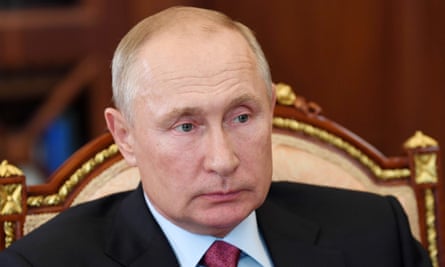Extract from The Guardian
Russian president has used various tactics over the years to avoid voicing his critic’s name

Last modified on Fri 4 Sep 2020 06.08 AEST
Over the past two decades, Vladimir Putin has referred to Alexei Navalny as “a poor excuse for a politician” and “a certain political force”. He has called him “the character you mentioned” and “this gentleman”.
He has never in public called him Navalny.
As of Thursday afternoon, Putin had not yet commented personally on Angela Merkel’s statement that the Russian opposition politician “unequivocally” had been poisoned with novichok, but if he goes according to previous form, he will use various linguistic tricks to avoid voicing his critic’s name.
Putin’s reluctance to say the word Navalny out loud has led to comparisons to Lord Voldemort, the villain in the Harry Potter series whom other characters do not name. Navalny has also been banned from appearances on state television, and is mentioned there only rarely and in a negative light.
The only time Putin is known to have uttered Navalny’s name was during a drinks reception in 2013, when he was asked by a journalist whether the omerta around Navalny’s name was deliberate. “No, why? Alexei Navalny is one of leaders of the opposition movement,” said Putin.
As more time has gone by, he has refused to mention the name even when challenged directly. “Those whom you’ve named are the same as Saakashvili, only the Russian version,” he said when asked about Navalny’s political plans in 2017, referring to Mikheil Saakashvili, the reformist former president of Georgia.
After that press conference, Navalny joked on Twitter: “‘Those whom you’ve named’ has now been added to my collection of words used to avoid saying ‘Navalny’.”
A year later, an Austrian interviewer twice asked Putin directly why he never said Navalny’s name. Putin ignored the question both times.
Most senior officials have followed Putin’s lead. Putin’s spokesman, Dmitry Peskov, does sometimes use the word Navalny, but has also on occasion used contorted references such as “the above-mentioned citizen”.
The sensitivity around the name suggests that the Kremlin feels the best way to defeat Navalny is to deny him the oxygen of publicity. The brief period when the Kremlin decided it was better to defeat him at the ballot box and allowed Navalny to stand in Moscow mayoral elections in 2013 was swiftly curtailed as too dangerous after he got 27% of the vote despite having no access to state television.
In the years since he has been featured on TV only as the subject of dubious “exposés” about his supposed illegal activities. Even the news of his poisoning with novichok was given only a brief mention.
Sometimes Navalny’s investigations appear to have touched such a nerve that their subjects could not refrain from replying, usually ignoring the detail of the allegations and instead resorting to threats. Perhaps the most memorable of these ripostes came from Viktor Zolotov, the head of Russia’s 300,000-strong national guard and an old Putin confidant, who recorded a threatening video message after Navalny alleged corruption in the guard.
“Nobody has ever given you the spanking you deserve, so hard that you feel it in your liver,” said Zolotov, in full uniform and waving his fist. He challenged Navalny to a duel and said he would make “a juicy steak” from him.
The billionaire oligarch and former Arsenal shareholder Alisher Usmanov made two angry videos addressed to Navalny after allegations of corruption, in which he also accused Navalny of exaggerating threats he had received.
“You call out from every street corner that you are being persecuted, that the government is ruthless. Ruthless? You spent a whole day in jail. One night, as far as I know,” Usmanov said in a 2017 video. The claim was wrong at the time – Navalny had just been released from 15 days in jail, one of many stints behind bars – and looks even worse in light of the poisoning.
But the preferred tactic from Putin has always been silence. Now that world leaders are demanding answers, it may be that the Russian president finally has to say the name aloud. Already, Vyacheslav Volodin, the chair of the Duma and a former Putin aide, has done so, albeit to promote a conspiracy theory.
“The situation with Navalny is further proof that this was all a planned action against Russia, with the goal of introducing new sanctions and halting our country’s development,” Volodin said on Thursday.
No comments:
Post a Comment